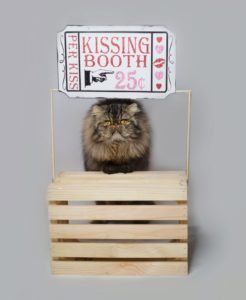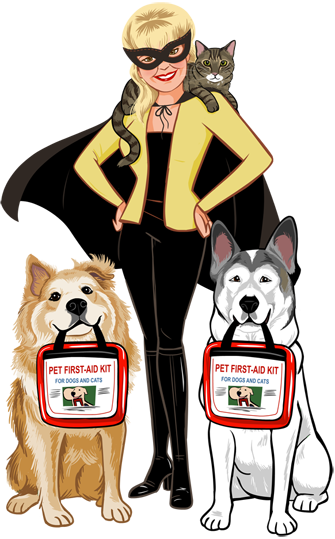
“The look” melted Steve’s heart as he savored his Valentine chocolates with his Sheltie, Dixie, looking on. For this loving pet dad, telling his furry angel, “No!” grew increasingly difficult as Dixie whimpered and whined, licking her tiny lips and cocking her head in the cutest way possible. Wanting what was best for his pup, Steve created a diversion. He stowed the chocolates in an out-of-paws reach cabinet, and then took Dixie for a car ride (safely strapped in her doggie seat belt) to the local pet bakery for dog-friendly carob treats. Not only did Steve know that once a dog tastes chocolate, she will want more (well, who doesn’t?!), but Steve was also aware that the sweet treat, loved by humans, can be deadly to our pets.
According to the ASPCA, its Animal Poison Control Center sees a rise in poisoning cases around February 14th, but just why is chocolate toxic to our furry pals? Theobromine, a naturally occurring methylxanthine found in cocoa, similar to caffeine, can affect your pet’s cardiac, neurological and gastrointestinal systems. The only good news is, it takes a fairly large amount of theobromine to cause a toxic reaction, still…every pet is a unique individual, and some suffer ill effects from the smallest amount of a substance. Once swallowed, there is no specific antidote for chocolate poisoning, so if you suspect your dog has consumed chocolate, call your veterinarian at once! Provide your best estimate as to how much your dog ingested, his weight, whether it was milk or dark chocolate and the symptoms your dog is presenting. Your veterinarian may suggest you induce vomiting at home, or tell you to head right to the vet clinic, so listen carefully to instructions.
Chocolate however, is not the only thing that can turn Valentine’s Day pet un-friendly:
Artificially Sweet
If a friend or loved one is counting calories this holiday, you may kindly oblige with low-calorie treats. Just be double dog sure that nothing with xylitol touches canine lips! This artificial sweetener can cause a sudden drop in a dog’s blood sugar, resulting in seizures, coma and liver failure. Keep xylitol, and anything labeled “sugar alcohols,” out of paws reach. And since this is a holiday for lovers, let it be known, SOME DOGS WILL EAT ANYTHING! Many personal lubricant products pose a diarrhea risk should your pooch consume them however, a few products contain xylitol, so can be much more dangerous. Read labels!
Take Time to Smell the Flowers
With their keen sense of smell, animals notice the scent of flowers too, and often consume them, but some varieties are toxic. When you receive a bouquet, take a moment to sift through and remove any dangerous flora before your pet gets near. Then, when gifting cat lovers, request the florist, HOLD THE LILIES! Ingesting only two leaves or petals from a true lily (i.e. Asiatic lilies, Peace lilies, Daylilies and Lily of the Valley) can result in a fatality. When ordering roses for any pet lover, kindly ask the florist to snip the thorns to prevent punctures should a curious pet get too near. It will make an even more thoughtful gift, when you show concern for your loved one’s furry family as well.
Smell Good for the Big Date!
Perfumes are made of essential oils and alcohols, not ingredients topping the list of edibles for pets. More likely than not, your dog or cat may sample a taste off your arm after you splash some on, and then no more, but to a Chihuahua, a small lick might be enough to make her feel queasy. Hopefully, your pet won’t acquire a thirst for cologne, but of course, anytime your pet isn’t quite right, call your veterinary professional at once!
Gift Giving
Holidays often call for the presentation of gifts, big or small, that come with tape, ribbons, bows and cellophane, all of which are fun to chew if you are of the furry persuasion. Quick clean-up is your best bet to prevent a choking incident or intestinal blockage. If the gift giving includes an actual puppy or kitten, please, please, please make sure it was a planned gift that the recipient was prepared for. Adding a fur friend to the family is a life-long commitment and should be chosen by the caregiver, so a gift certificate to adopt from your local animal shelter on your friend’s time schedule might be a better option.
Toast Your Sweetheart, NOT Your Pet
Animals are obviously smaller than humans, so even a little alcohol can do harm resulting in vomiting, diarrhea, central nervous depression, tremors, breathing difficulty, coma and death! Keep paws and tongues OFF adult beverages! Lapping up a small spill, or even licking out a wine glass could spell trouble for your furry best friend.
Marijuana
Legal in many states and readily available, marijuana can be found in brownies and other baked goods, chocolates, gummies and even lotions that may be part of Valentine’s gift giving. Although CBD, which does not contain psychoactive THC (tetrahydrocannabinol), is showing positive health benefits for pets, marijuana is dangerous and even deadly.
Candles and fireplaces can be oh, so romantic, but make sure pets can’t get too near flames, that sparks don’t fly or candles topple over. Table tops and shelves are not safe from high vaulting felines or counter surfing pooches, and with their sensitive noses, pets may be bothered by scented candles or smoke. Use with caution.
Keep the sparkle on the fingers, wrist, ears and neck, not inside the pet!
Valentine’s is a popular holiday for proposals, diamond anniversary rings and jewelry in general. Whatever clever way you decide to gift your lady or man with bling (in the bottom of a champagne glass, topping tiramisu, tied to the collar of a plush dog toy), just make sure it doesn’t end up inside your own precious LIVE pet, or you’ll spend the remainder of the holiday looking for him to “deposit” it in the backyard, or worse…choking or having it surgically removed!
May it be a very safe and Happy Valentine’s Day for you and your furry family!
Denise Fleck is the Pet Safety Crusader™ having personally taught more than 31,000 humans to rescue Rover or help Fluffy feel better. Her mission is to help YOU make a difference in the life of an animal through Pet First-Aid, Senior Pet Care and Disaster Preparedness classes and books. Learn more at www.PetSafetyCrusader.com








